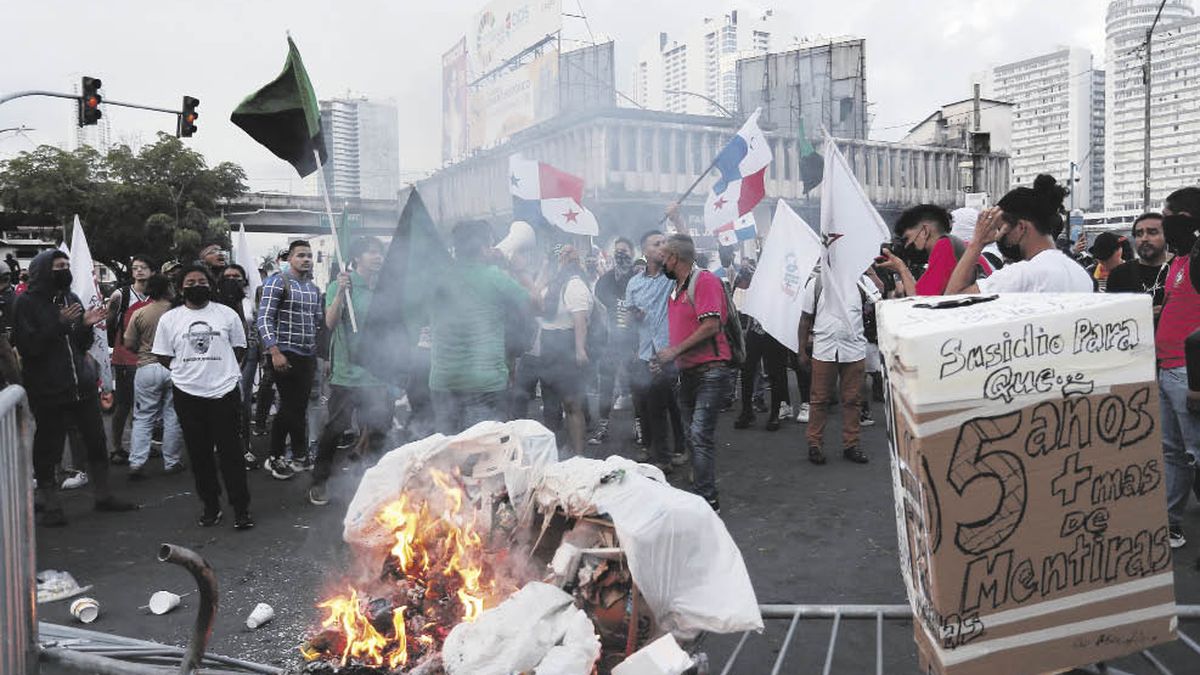In Panama, boredom over rising fuel prices and corruption cases triggered the biggest protests in three decades and threaten to undermine stability.
“The cost of living is what has the people on the streets, the people ask for social justice,” said Sergio Gallegos, one of the thousands of people who have protested in the last two weeks to demand that the government intervene and contain the prices of basic basket products and medicines.
The protests led to the closure of public schools, suspension of transportation and calls for strikes. The UN office in Panama called on the parties to “seek consensus”, while the Catholic Church offered to mediate in the conflict.
The discontent in the country that has a dollarized economy grows in a scenario of 4.2% year-on-year inflation registered in May and an unemployment rate of around 10%. In addition, the price of fuel has increased by 47% since the beginning of the year, currently costing 5.17 dollars per gallon of gasoline (3.78 liters).
Castle and Lasso
Meanwhile, the president of Peru, Pedro Castillo, last Tuesday asked the secretary general of the United Nations Conference on Trade and Development (UNCTAD), Rebeca Grynspan, for support to help the agricultural sector and counteract the food crisis.
Castillo has been formally abandoned by the party that brought him to government and, with minimal popularity levels, he is at risk of being removed by Congress.
In Ecuador, a dollarized country, the government and indigenous people began talks on Wednesday about more fuel subsidies and debt forgiveness, two critical issues that motivated the violent protests last month, which left six dead.
The negotiation process, which is expected to last 90 days and which, if it fails, could lead to new protests, is part of the agreement that both parties signed two weeks ago to end 18 days of demonstrations and in which the Executive agreed to lower the price of fuel by up to 8%. With the reduction, the gallon of diesel went from 1.90 to 1.75 dollars and that of common gasoline, from 2.55 to 2.40.
The indigenous movement, which then demanded a reduction of up to 45 cents, proposes more subsidies for the rural sector.
The Government of Guillermo Lasso ordered, in addition to a cancellation of debts of small farmers, an increase in assistance for low-income families and subsidies for agricultural inputs, which will cost the State more than 700 million dollars per year.
Chaos in Colombo
In Asia, Sri Lanka yesterday tried to regain a precarious calm after a popular uprising that ended with the government of President Gotabaya Rajapaksa, who fled to Singapore and presented his resignation yesterday with an email sent to Parliament.
After months of protests, a crowd invaded the presidential palace in Colombo on Saturday, the corollary of a serious crisis caused by the lack of foreign currency for imports.
Four out of five inhabitants must skip a meal due to the catastrophic economic situation. The country declared in April a default on its debt of 51,000 million dollars and is in negotiations with the International Monetary Fund (IMF).
The lack of foreign currency caused a fuel shortage that has almost paralyzed the country.
Prime Minister Ranil Wickremesinghe, whom the president appointed as interim head of state in his absence, called for the eviction of state buildings and instructed security forces to do whatever “necessary to restore order.”
The curfew was lifted early yesterday, but police said a soldier and an officer were injured in clashes overnight outside Parliament.
affected continent
In North Africa, Tunisia is facing a food crisis due to the Russian blockade of cereals from Ukraine caused by the Russian invasion and the increase in international prices.
Likewise, El País reported yesterday that “the rise in prices in Africa, especially gasoline and basic necessities, due to the war in Ukraine, with an inflation rate of over 14% in a dozen countries and runaway in many of them, it is already generating the first consequences in the form of increasingly intense citizen protests”.
Specifically, the Spanish newspaper mentions the cases of Ghana, Sierra Leone, Zimbabwe and Ethiopia. Likewise, in South Africa and Senegal, “recent political demonstrations led by the opposition also have an economic background, of citizen weariness in the face of famine.”
Source: Ambito
David William is a talented author who has made a name for himself in the world of writing. He is a professional author who writes on a wide range of topics, from general interest to opinion news. David is currently working as a writer at 24 hours worlds where he brings his unique perspective and in-depth research to his articles, making them both informative and engaging.




